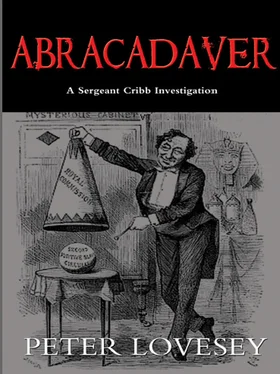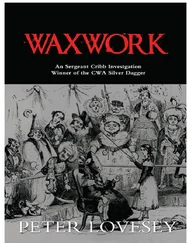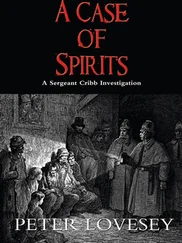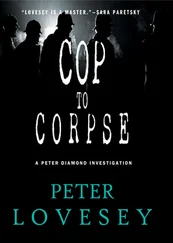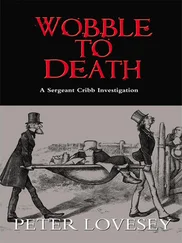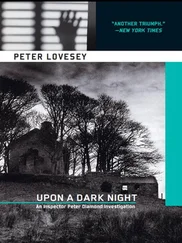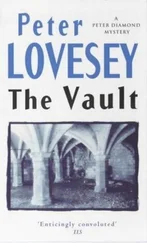‘You didn’t tell me, Sarge. Another C.I.D. man?’
‘For God’s sake, Thackeray. Third violin in the orchestra— didn’t you spot him?’
‘Not Major—’
‘Scraping away like a professional. At least we know he wasn’t blown to bits by the gas explosion. I’m surprised you didn’t spot him. Too much else to keep an eye on, eh? You’re yawning, Thackeray.’
‘It’s the dark, Sarge.’
‘The beer, more like. Look, we’re liable to be here an hour. Stretch yourself out on the bench and sleep it off. That’s an order. I want you sober, Constable.’
It was all a little humiliating, but Thackeray knew better than to defy orders. He wouldn’t actually sleep, but it would be a relief to get the weight off his feet. He groped along the bench, checking for loose nails and chips of wood, and put his hand on something soft, an overall perhaps, folded in the shape of a pillow. He lowered his head thankfully on to it. Not Cribb’s overcoat, surely? That was so unlike the man; there wasn’t an atom of pity in him, not for constables at any rate. Cribb didn’t believe in rests; forty winks any time was dereliction of duty. If he connived at that, he was planning something, you could depend on it.
Thackeray was uncertain how long he had slept when a nudge from Cribb revived him, but his bones ached and his mouth was dry. ‘What is it, Sarge?’
‘We’ll be on the move shortly. It’s half an hour since the National Anthem. Plenty of ’em have gone already. You’re in better shape, I hope?’
He was shivering and aching all over but he said, ‘Sharp as a winkle-pin, Sarge.’
‘Good. Hand me my coat, will you?’
‘Hurry please, everyone. Mr Plunkett wants you all out in the next five minutes,’ called a voice unpleasantly close to the door. Shrieks of protest answered from the ladies’ dressing-room up the corridor. ‘Five minutes, whatever state you’re in,’ reiterated the voice, and the ballet evidently took the warning seriously, for groups of booted feet clattered past very soon afterwards, and soon there was silence.
After a strategic interval, Cribb eased open the door to the passage, which was still fully lit. Thackeray blinked, looked down at his evening-suit and began brushing off wood-shavings.
‘Leave that, blast you,’ Cribb hissed, ‘and follow me.’ Thackeray obeyed, privately noting that his sergeant had reverted to type. They scudded as silently as two large men could along the passage and past the scene dock and Bellotti’s barrels to the area of the stage. A movement ahead stopped them short, and they backed into the shadows between some flats stacked in the wings. Groups of men in labouring clothes, corduroys and doe-skin waistcoats or short serge jackets, were talking in groups on the stage side of the lowered curtain. Far from preparing to leave, they seemed to be waiting for something. Several peered up at the battens and perches as though they had never stood on a stage before. More ascended the staircase from the canteen. They were followed by Plunkett.
Someone moved a stool into the centre of the stage and Plunkett stepped on to it and clapped his hands. ‘Thank you, gentlemen. If you will all come close I shall not need to shout. Most of you know me, but for those who are new to the Paragon I should explain that I am the theatre manager. You are responsible to me. The work I have for you is not taxing in a physical sense, but it is responsible work and you have been employed because you have the reputation of being responsible working men. The pay, you will know, is generous, to say the least. You will earn it by carrying out your orders with despatch, in silence and without question. Things you may see and hear tonight as you go about your work are not for you to question or comment upon, either tonight or later. I am very particular about loyalty among my staff and there are ways of cutting short loose talk. Do you all understand me?’
Concerted nods and grunts indicated that Plunkett was taken seriously.
‘Very well. You will work as teams of three and four under the direction of experienced scene-removers and you will carry out their orders implicitly. I shall be in the audience, but your foremen—to use a term familiar to you—will report fully to me before you are paid at the evening’s end. You will now repair to the supers’ room, which is on the O.P. side of the stage—behind me. You will find there your uniforms for tonight. You are to be dressed as footmen—ah! Already I see looks of dismay among you, as you imagine the contempt of your fellow-artisans when they learn that you have been seen in stockings and wigs. But allow me to remind you that what happens at the Paragon is not to be the subject of taproom conversations. The memory of your eccentric appearance—which I may say will be perfectly accepted by the audience—will assist you to control your tongues. You have ten minutes then to select a set of clothes that fit, after which you will return here, to be divided into work-teams and to receive your instructions. Look sharp, then.’
Far from that, the recruits looked dumbfounded, but someone made a move towards the O.P. side, and the rest shuffled bleakly after, unprotesting. Plunkett descended from his stool and returned the way he had come.
‘Capital!’ whispered Cribb. ‘First piece of luck we’ve had, Thackeray. Take off your jacket and trousers.’
Had he heard correctly? ‘My—’
‘Hurry man. Get ’em off and wait here.’
‘Where are you going, Sarge?’
But Cribb was already striding openly across the empty stage, and there was such an air of urgency in his movements that Thackeray was infected with it and found himself actually beginning to carry out the preposterous instruction. He hung his jacket on a convenient nail, unbuttoned his waistcoat and loosened his shoe-laces. There propriety called a halt until a minute or so later when Cribb marched back, a set of garments over his arm. ‘Trousers, too, Constable. You can’t appear as a flunkey in a satin jacket and black twill bags. You’re joining the scene-removing squad. Get these things on quick. Stockings first.’
Good Lord! The Yard in white silk stockings? Was Cribb finally deranged? ‘Sarge, I really don’t feel it would be fitting to our position as officers. You a sergeant—’
‘That’s all right, Thackeray. It’s only you that’s dressing up. I’ll be among the audience—watching developments, of course. Try the breeches now. They were the largest I could find. You’ll need to adjust the buckles round your calves. There isn’t much time, so listen carefully. There’s no-one likely to recognise you, but keep your wig on all the time, and if you go on stage try not to show your face to the audience.’
‘Would you, dressed like this?’ asked Thackeray bitterly, standing up in his yellow satin breeches. ‘I can’t do it Sarge.’
‘Nonsense, man. You’ll be no different from the others. I collected these things from the room where they’re changing. They took me for one of the staff. They’re kitted out in yellow just like you, and they’re just as sensitive about being made to look like—er—footmen. Don’t you see, Thackeray? You’ll be perfectly placed to observe what’s going on. Tonight could settle this case for us. We’re about to get our answers. Now put on the jacket and wig. Your fellow-workers’ll be here shortly and I must be gone. Splendid! That’s a better fit than the trousers. Push your evening clothes into the corner there. When they assemble, you simply join in as though you’re one of the recruits. Carry out your orders like the rest, whatever happens. And Thackeray . . .’
‘Sergeant?’
‘I feel obliged to warn you that there could be rum goings-on here tonight.’
Читать дальше
